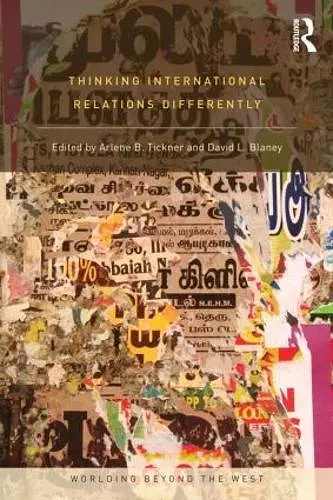Thinking International Relations Differently
Arlene Tickner editor David L Blaney editor
Format:Paperback
Publisher:Taylor & Francis Ltd
Published:7th Feb '12
Currently unavailable, and unfortunately no date known when it will be back
This paperback is available in another edition too:
- Hardback£150.00(9780415781305)

A host of voices has risen to challenge Western core dominance of the field of International Relations (IR), and yet, intellectual production about world politics continues to be highly skewed. This book is the second volume in a trilogy of titles that tries to put the "international" back into IR by showing how knowledge is actually produced around the world.
The book examines how concepts that are central to the analysis of international relations are conceived in diverse parts of the world, both within the disciplinary boundaries of IR and beyond them. Adopting a thematic structure, scholars from around the world issues that include security, the state, authority and sovereignty, globalization, secularism and religion, and the "international" - an idea that is central to discourses about world politics but which, in given geocultural locations, does not necessarily look the same.
By mapping global variation in the concepts used by scholars to think about international relations, the work brings to light important differences in non-Western approaches and the potential implications of such differences for the IR discipline and the study of world politics in general. This is essential reading for anyone who is concerned about the history, development and future of International Relations.
Arlene Tickner and David Blaney explore how knowledge of the international is produced in different parts of the world in this important edited volume. They challenge the boundaries, expand the definition of the subject, and create space for a de-centering of the field of IR. They are sensitive to the diversity of ways in which theoretical knowledge is socially and historically situated and explore how concepts become rearticulated in different parts of the world. They argue that recognizing multiple traditions is necessary for a genuinely global dialogue and present a "world of worlds" in which diversity flourishes.
Thomas Biersteker, The Graduate Institute, Geneva.
This book is an immense achievement. For a discipline that claims to research and teach ‘the international’, IR has always been a provincial place. Unthinking traditional conceptions of world politics is a steep challenge, yet meeting it has now become possible with Thinking International Relations Differently.
Tim Dunne, University of Queensland.
IR theorists in the Anglophone world mostly (but not entirely) outside North America have often celebrated the diversity and critical edge of their contributions—and not without significant cause. Yet this enterprise in International Relations theory has singularly and spectacularly failed to attend to the European-modern episteme upon which most of the many fascinating manifestations of theory of the international claim their authority to speak of global order in general terms. Is this failure born of reticence, blindness or ignorance? Whatever the case, such a phenomenon provokes a more fundamental question: is International Relations theory an impossibility?
If you apprehend this question with some urgency, or, if you simply find it an interesting provocation, then Thinking International Relations Differently is obligatory reading.
Robbie Shilliam, Queen Mary, University of London
ISBN: 9780415781312
Dimensions: unknown
Weight: 800g
362 pages